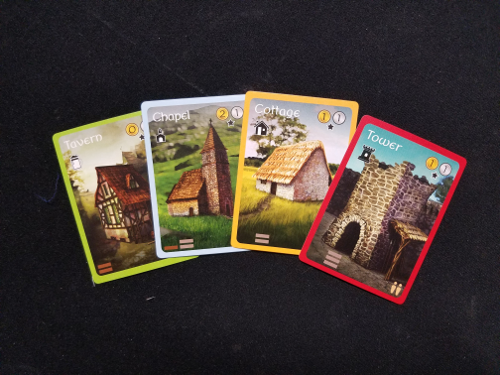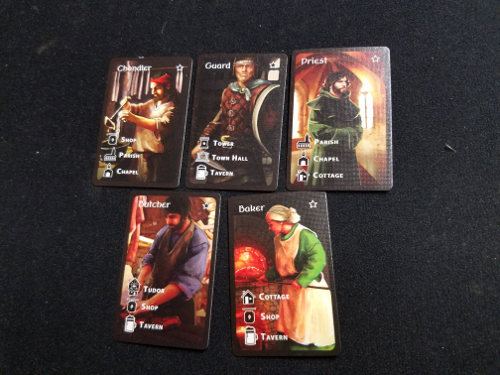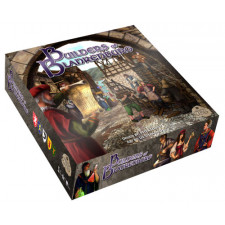Builders of Blankenburg Review
on May 17, 2017
There are more than a few city building games out there. Most of them focus on a spatial challenge of constructing the right items in the right areas. But Builders of Blankenburg goes just a bit further. As the town is constructed, more and more people come to live there – and they have their preferences of where to live. Players not only have to build the most prestigious buildings, but also will want to accommodate the new citizens.
Play flows from round to round smoothly. Each turn begins with several resource types available on a bidding wheel. The wheel has the untaken items from prior rounds as well as a few additions determined randomly. The highest bidding player gets first choice of resource and can take up to three of that type, then the next highest picks, and so on.

After players have a few resources in their pocket, they can construct any of the buildings they have in their hand, or the communal building available to everyone. Each must be built in one of four districts on the board. If there is no room for that type of building, then it can’t be constructed. Every building grants some amount of prestige to the owner – depending on how expensive it is to construct.
During the next phase, there is an Event which can change things up for the round and a Visitor which brings some sort of special power. Then the Visitor and each existing Citizen pays money to stay at certain buildings. The Baker, for example, wants to stay at a cottage. But if there isn’t one, she’ll stay at a Shop or Tavern. If you own the Cottage, she stays with you and pays you the fee. This is the main way to earn income.
After that, there is a brief market phase where you may be able to spend some money to directly buy resources you need. The game ends when twelve citizens are on the track or when all building spots have been used. Most prestige wins.
Blankenburg has an interesting philosophy of constant interaction. While you can’t destroy other players’ buildings or make them discard, the competition is nevertheless fierce at every level. The auction round has players vying for limited resources in a way that brings home the primacy of economic development. Buildings can be constructed only where there is available land and it isn’t uncommon to try to construct something just to deprive opponents. In the market, a resource could be depleted depriving opponents of the chance to buy it. But perhaps most interesting is the citizenry.
Let’s say a citizen wants to stay at a Forge, a Manor, or a Cottage. If I build a Cottage, and there is no Forge or Manor, then they’ll stay with me and I get the money. But if you then build a Manor, they’ll stay with you, give you money, and leave me out in the cold. Unless, of course, I build go on to build a Forge.
Because of the shifting way in which the citizens decide where to stay, your economic foundation is never totally secure. You have to constantly evaluate how you can dig into your opponents’ income. And also ensure that you have enough buildings to capitalize on as many citizens as possible. Best of all, their preferences are laid out for all to see. So their choices and the resulting income doesn’t feel random; the players can plan out what and when to build.
And that highlights an interesting tension in the building of Blankenburg. Every structure has several considerations. Can it be used to block opponents? Will it get you income from citizens? Will it help you with end-game majority scoring? How much prestige will it get you right now? Almost no building will be good on all counts. Instead, you have to carefully balance the factors when deciding what to construct.
Blankenburg also does a good job of scaling. The board is double sided and you can use the small side for 2 and 3 players or the larger side for 4 or 5. Or even mix it up to your group’s preference. And play time also scales nicely. Although the citizen track accommodates twelve dudes, it starts with one per player. So, in a two player game, the individual rounds are shorter but you tend to play more of them. With five, the opposite is true. And distributing resources by auction insures that there is serious competition at all player counts.

If there is one negative about the game, it’s the terribly formatted rulebook. Don’t get me wrong, the book has everything you need to play and explains the game well. But it does so in giant paragraphs. No bullet points and few numbers. This makes it difficult to skim back through and find a rule you may have forgotten or quickly identify setup information.
That aside, though, the experience of Blankenburg is actually quite good. Interaction is strong, the game moves quickly, and the conclusion tends to come just a hair before you’re ready- which is often the sign of a good experience. If you like city building or even euro style games in general, then this is definitely one to check out.

 Customer Support
Customer Support  Subscribe
Subscribe 




 Account
Account  Wishlist
Wishlist 

